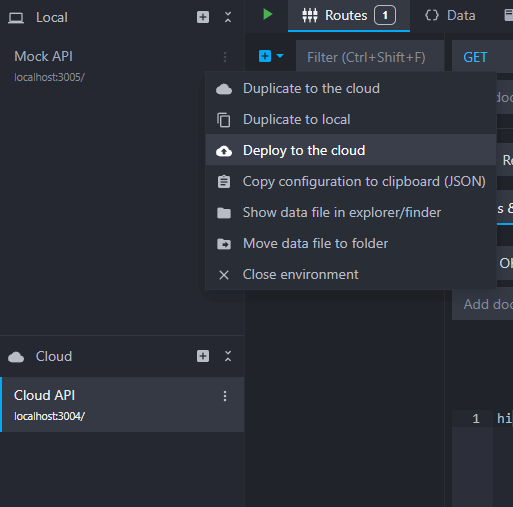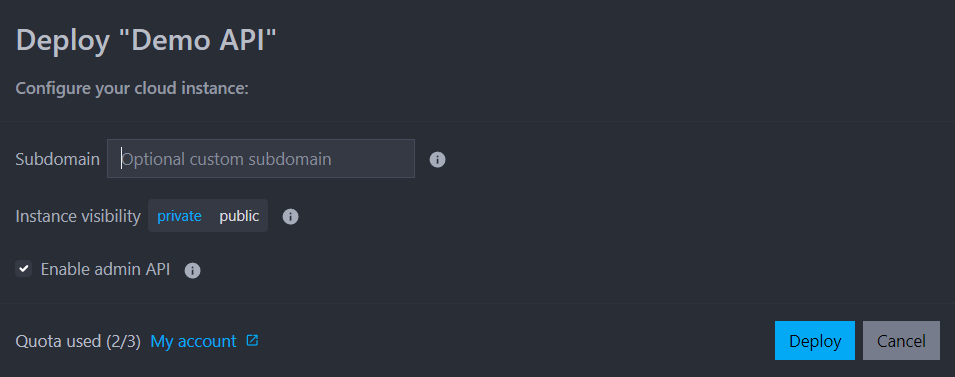Cloud API mock deploymentsCloud
Mockoon Cloud allows you to deploy your mock APIs in the cloud and share them with your team, clients, or class. This feature is available in the desktop application and is part of the Mockoon Cloud paid plans. Read on to learn how to use it and the different features it offers.
Managing your cloud deployments
Deploy an environment to the cloud
You can deploy an environment to the cloud using the context menu in the local or cloud environments list and selecting "Deploy to the cloud":

In the deployment dialog, you can further customize your instance:
- Subdomain: The default subdomain is generated automatically, but you can customize it to a unique value. The subdomain will be part of the instance URL (e.g.
https://{subdomain}.mockoon.app). - Visibility:
- Public: The environment will be accessible to anyone with the URL.
- Private: The environment will be accessible only to users with the URL and the API key (see Instance URL and visibility below).
- Enable/disable the admin API: Enable/disable the admin API available on a running mock on the
/mockoon-adminendpoint.

After clicking the "Deploy" button, the environment will be uploaded to the cloud and will be accessible using the provided URL. In the management dialog, you can find the URL and the API key to access the environment. You can also re-deploy the environment or delete the instance:

Re-deploy or delete a cloud instance
In the management dialog, you can re-deploy the environment or delete the instance using the menu:

Instance URL and visibility
The instance will be deployed on a shared cloud infrastructure and will be accessible using a unique URL in the form of https://mock-abcd1234.mockoon.app. The URL will be displayed in the management dialog and can be shared with your team, clients, or class. You can also customize the subdomain part of the URL when deploying the environment.
The visibility of the environment can be set to public or private. Here are the differences between the two:
- Public: The environment is accessible to anyone with the URL.
- Private: The environment is accessible only to users with the URL and the API key. The API key is displayed in the management dialog and must be included in the request
Authorizationheader to access the environment.
Unsupported features
The cloud deployment feature does not support the following features:
- Custom TLS and hostnames are not supported and will be disabled in the cloud environment.
- External files linked to the environment are not uploaded and served (e.g. environment's certificates or files used in the "File" response body type). File serving is generally not supported in the cloud environment.
- The proxy mode will be disabled if it points to a local address or IP (e.g.
localhostor127.0.0.1). - Callbacks pointing to a local address or IP (e.g.
localhostor127.0.0.1) will be disabled. - WebSockets are currently not supported but will be added in a future version.
Major versions migrations
Future major versions of Mockoon may introduce breaking changes to the data model of your environments. When this happens, instances already deployed to the cloud will continue to work with the previous version of Mockoon. However, you will need to re-deploy the environment to the cloud to benefit from the new features and improvements.
⚠️ We strongly recommend to update your local Mockoon application as soon as possible to the latest version to avoid any compatibility issues.
Plans quotas and limits
Some quotas and limits apply to the cloud deployment feature. Here are the main ones:
- Solo plan:
- 1 cloud deployment.
- 50 000 requests per month.
- 5 requests per second.
- Team plan:
- 3 cloud deployments.
- 100 000 requests per month.
- 10 requests per second.
These quotas and limits are subject to change. Please refer to your account settings for the latest information.
Future improvements
The cloud deployment feature is still in its early stages. Here are some improvements we are working on:
- Support for environment variables.
- Offer more instance locations and the ability to choose the closest one.
- Possibility to link a custom domain to the instance.
- Possibility to renew the API key.